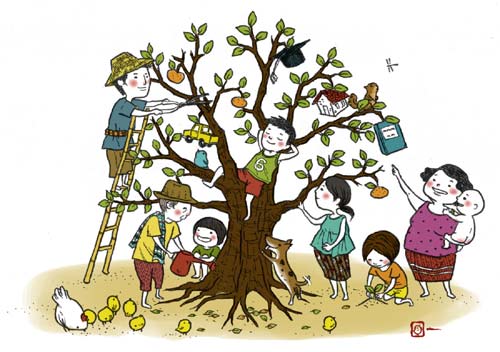当前位置: Language Tips> 英语学习专栏
自人类诞生之日起,树木就一直忠实地陪伴着我们。年复一年的生息轮回中,除了年轮的增长,我们似乎很难察觉树木所经历的改变。然而,我们的这些老朋友在全球气候急剧变化的今天却遭遇了前所未有的困境。

By Randy Rieland
经纬 选 张涛 译
|
Trees have been one of the most stable and reliable companions of human beings since the very beginning. They sprout in the spring and their leaves fall in the autumn, and we know the cycle will start all over again next year, being one of the truer things in modern life. I mean, what’s more reliable than an oak? But scientists will tell you that, like the oceans, the world’s trees are going through some serious changes, and not in a good way. For example, consider the impact of the drought that’s been desiccating America’s Southwest. The Texas A&M Forest Service issued a damage report in last September: More than 300 million trees died in Texas forests alone as a result of the 2011 drought. It killed another 5.6 million trees in Texas cities. Then a study published in Nature Climate Change in last October concluded that if current climate trends continue, forests in the Southwest will die out at an accelerating rate. And not just from rising temperatures and lack of rain, but also from invasions of tree-eating pests and more destructive forest fires, also tied to climate change. By analyzing forest fire data from satellites for the past 30 years in parallel with data on tree ring growth over the same period, the researchers were able to see a “strong and exponential” relationship between droughts and the number of acres of forests wiped out by wildfires. Park Williams, a scientist at the Los Alamos National Laboratory in New Mexico and lead author of the study notes: “This suggests that if drought intensifies, we can expect forests not only to grow more slowly, but also to die more quickly.” Computer models suggest that for 80% of the years in the second half of the 21st century, America’s Southwest will suffer through what the study describes as “mega -drought.” In the spirit of giving trees more than a seasonal glance, here are eight other things scientists have learned about them in 2012. 1. Forest fires have become more intense and harder to control. One big factor is the rising frequency of what are known as “blowdowns.” With violent storms with strong winds occurring more often, whole sections of forests are toppling over, creating, in essence, giant campfires awaiting a spark. 2. The death of forests could double the number of big floods. A study at the University of British Columbia concluded that faster snow melts due to fewer trees creating shade will not only increase the size of floods, but could also make the really big ones happen more often. 3. Sick trees could be boosting greenhouse gas levels. Scientists at Yale University found that diseased trees can carry very high levels of methane, one of the more potent greenhouse gases. Although they appear healthy, many old trees—between 80 and 100 years old—are being hollowed out by a fungal infection that slowly eats through the trunk, creating a nice home for methane-producing micro-organisms. 4. NASA technology could help save trees that look risky. The space agency is using high-tech cameras to create 3-D images of trees, a process that will help experts get a better idea of where a tree is likely to crack and how it might come down. Ideally, this could help save trees that arborists now would probably cut down. 5. Will it be smarter to grow smaller trees? Scientists at Oregon State University think so. They believe it will make sense to grow genetically-modified “semi-dwarf” trees in the future to make them better suited for drier climates and as a source of bio-energy. 6. Slow down on the maple syrup. The U.S. Forest Service says that climate change is likely to diminish production of maple syrup later this century. The reason? Habitats suitable for maple trees are expected to shrink. 7. Fossilized forests could come back to life. Forests in the Canadian Arctic that last were alive more than 2.5 million years ago could be revitalized by climate change, according to a University of Montreal scientist. Alexandre Guertin-Pasquier says that, according to climate change forecasts, temperatures could rise to levels similar to when willow, pine and spruce trees thrived in now snow-covered places such as Bylot Island. 8. Good trees make good neighbors? Studies in three American cities–Baltimore, Philadelphia and Portland, Ore.–concluded that urban neighborhoods with more trees tend to have lower crime rates. While no researcher would go so far as to say that trees reduce crime, they did find a “very strong association” between more tree canopy and less crime. |
从古至今树木都是人类最忠实、最可靠的伙伴。它们在春日吐芽、秋日落叶,每一年都会迎来新的轮回,它们是现代社会最为真实的风景之一。你说,还有什么能比一棵橡树更值得人信赖呢?然而,科学家们会告诉你,世间的树木就像海洋一样,正经历着一些翻天覆地的变化,但这并不是什么好事。 例如,让我们看看美国西南部地区的旱灾对树木造成的影响。得克萨斯州A&M林务局于去年九月发布了旱灾损失情况报告:仅得克萨斯州林区里就有三亿多株树木死于2011年的旱灾。旱灾还导致了得克萨斯州各城市中560万株树木死亡。 随后,一篇于去年十月在《自然气候变化》杂志上发表的研究报告指出,如果目前的气候变化趋势持续下去,美国西南部的森林将以更快的速度消失。气温升高、降雨匮乏,还有啃噬树木的害虫入侵,以及毁灭性的森林大火,这些都与气候变化不无关系。 通过对比分析过去30年里卫星记录的森林大火数据以及同时期树木年轮生长情况的数据,研究者们得以发现干旱与被大火吞噬的森林面积之间存在着一个强劲的正向关系,且增长速度越来越快。 作为新墨西哥州洛斯阿拉莫斯国家实验室的一名科学家,同时也是该研究报告的第一作者,帕克•威廉姆斯指出:“这表明如果干旱加剧,我们不但会发现森林的生长速度放缓,更会目睹其加速死亡。”计算机模型显示,在本世纪下半叶80%的年份里,美国西南部将遭受如该研究报告所描述的“超级旱灾”。 除了季节性因素外,我们希望能从更多的方面研究树木,以下是2012年科学家们关于树木的八大发现,让我们一起来看看。 1. 森林大火破坏性越来越大并难以控制。 (导致此现象的)一个重要因素是所谓“被刮倒的树木”越来越多。强烈的暴风雨伴随着大风的天气越来越常见,整块森林都会被吹倒,这时如果稍有一丝火星,就会引起巨大的“森林篝火”。 2. 森林的死亡会加剧洪水的泛滥。 不列颠哥伦比亚大学的一项研究显示,树木的减少意味着树阴的减少,树阴的减少会导致积雪的融化速度加快,这不仅会使得洪水的水量增大,还会让特大洪水更为频繁地发生。 3. 患病的树木会释放更多的温室气体。 耶鲁大学的科学家们发现患病的树木会释放含量很高的甲烷——导致温室效应的主要气体之一。尽管许多树龄在80到100岁之间的树木看起来很健康,但是它们的树干已被真菌慢慢侵蚀掏空,成为了滋生微生物的温床,而这些微生物能够释放出大量的甲烷。 4. 美国国家航空航天局的技术能拯救濒危的树木。 该机构正在使用高科技照相机为树木制作3D影像。这一举措能帮助林业专家更好地熟悉树木的那些部分容易断裂,以及树木会如何倒下。理想情况下,这项技术能够拯救那些可能会被育树专家们砍掉的树木。 5. 种植小型树木更为明智吗? 俄勒冈州立大学的科学家们正是这样认为的。他们相信,未来种植经过基因改良的“半矮”型树木是非常明智的,这样的树木能更好地适应干旱气候并成为生物能源的来源之一。 6. 枫糖浆产量会下降。 美国国家林务局称,本世纪后期,气候变化很可能会导致枫糖浆减产。究其原因:适合枫树生长的林地正在逐渐减少。 7. 石化森林可能会复活。 蒙特利尔大学的一名科学家亚历山大•盖尔丹•帕斯奎认为,曾在二百五十多万年前生长于加拿大北极圈内的古代森林或因气候变化而复活。他指出,根据对气候变化的预测,在如拜洛特岛那样被冰雪覆盖的地区,气温可能升高到适于柳树、松树和云杉等树种生长的程度。 8. 良好的树木覆盖率能创造良好的邻里关系? 对美国三座城市——巴尔的摩、费城以及俄勒冈州波特兰市的研究表明,城市社区树木越多,犯罪率越低。没有哪位研究者敢断言树木能降低犯罪率,但他们确实发现高森林覆盖率和低犯罪率之间存在着“非常明显的关联性”。 (来源:英语学习杂志 编辑:丹妮) |
|
Vocabulary: 1. sprout: (植物)发芽,抽芽。 2. drought: 干旱,旱灾;desiccate: 使变干,使干涸。 3. die out: 绝迹,灭绝;accelerate: 加快,加速。 4. pest: (毁坏庄稼或植物的)小动物,害虫;tie to: 与……有联系,与……相关联。 5. in parallel with: 与……同时,与……平行;tree ring: (树木的)年轮;exponential: 越来越快的增长、增加;wipe out: 彻底毁灭,抹去。 6. mega: 巨大的,庞大的。 7. in the spirit of: 本着……的精神。 8. topple over: 倒塌,倾覆;spark: 火花。 9. melt: n. 融化。 10. boost: 促进,推动。 11. methane: 甲烷;potent: 效力大的,强效的。 12. hollow: 把……挖空,使成中空;fungal: 真菌的,由真菌引起的;infection: 感染。 13. maple syrup: 枫糖浆,由枫树木质部汁液熬制成的糖浆。 14. diminish: 减少,减小。 15. habitat: (动植物的)生活环境,自然栖息地。 16. fossilize: (使)成化石,石化。 17. canopy: 遮盖,覆盖。 |
上一篇 : 贝多芬的阴谋
下一篇 : 艾玛•沃森:打破“赫敏”魔咒
关注和订阅


电话:8610-84883645
传真:8610-84883500
Email: languagetips@chinadaily.com.cn